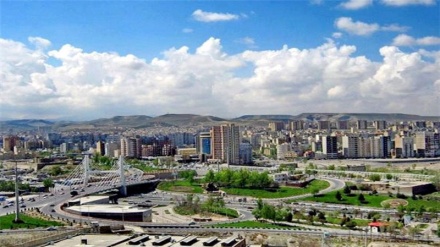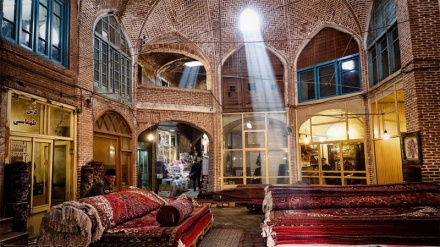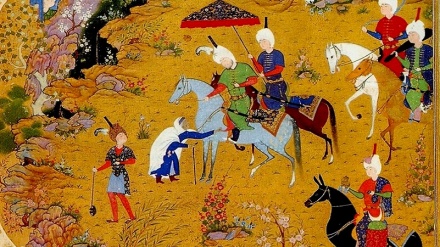Tabriz, 2018 (7)
Welcome to this week's episode of the series Tabriz, 2018. The music of the city of Tabriz, as one of the Azari cities, maintains an especial originality and beauty. The well-established Ashiq music has been blended with the local fate of Azari people. In fact, the music of Azarbaijan has developed and progressed by the Ashiq musicians and vocalists. Today, we become familiar with Ashiq Music.
The oral literatures of nations maintain ancient histories and are the heritage of prudent creations which have begun in ancient times as the result of work and activities of human beings, gradually developing and growing as time passed by. Music is one of the main principles of folklore. Study of the music of communities and ethnicities has been defined as the study of music in social and cultural domains, and is therefore a combination of musicology and anthropology.
In East and West Azarbaijan Provinces, the art of popular music is also known as Ashiq Music, which has attained an elevated status in the folk literature and culture of this region. Ashiq musicians and vocalists are known as the best ones in Azarbaijan region, capable of concurrently creating, producing and performing their art. Ashiq musicians and vocalists perform attractive songs, coupled with Azari music, in description of Azarbaijan region, and heroism of this region's leading figures, throughout festivities and mourning ceremonies, capturing the attention of people.
Ashiq musicians and vocalists lived among Turkic people since the pre-Islamic era. Small statues of a musician, dating back to 2000 BC, are on display in Iran-e Baastaan Museum in Tehran, and Louvre Museum in Paris, standing and holding his musical instrument next to his chest. Such musicians, which can only be found among present-day Turkic people, present us with clues about the history and background of Ashiq Music. Ashiq musicians and vocalists, as the narrators of hardships and woes, and heroic tales are highly honored and respected among Azari people. This honor and respect can be observed in a number of stories; within which the Ashiq musicians and vocalists play the leading roles.
The 13th Century AD Azari Musician, Safi Ed-Din Ermavi, and 14th Century AD Azari Musician, Abdul-Qader Maraqei; both of whom were globally famous musicians, highly contributed to the foundation of scientific principles of music.
The history of birth and formation of Ashiq Music among Turkic people is shrouded in obscurity. In accordance with a number of writings which have been collected in and out of Iran, by the researchers of history and literature of Azarbaijan region; the Ashiq Music, throughout the course of history, has blended with the beliefs of ancient Turkic ethnicities, resulting in the formation of an art, with wide-scale dimensions, consisting of the elements of poetry, music, lyrics, and collective dance. This art later came to be known as Ashiq Music.
This art which maintains an ancient history, remains live and dynamic among different Turkic ethnicities across large swathes of Iran, Turkey, and the newly independent republics of former Soviet Union; while even stretching to China and some non-Turkic ethnicities. In fact, cases of Ashiq Music can be observed among Georgians, Armenians, and a number of other ethnicities.
Ashiq musicians and vocalists can be named as the best artists of Azarbaijan region; given that they compose poems, create music and harmonious rhythms, while also performing their own songs.
Ashiq musicians and vocalists are concurrently capable of creating, producing, and performing, while also displaying emotions.
Ashiq is an artist, who plays a musical instrument, and sings. He in fact comes to existence upon playing his musical instrument. He is not a complete artist if he doesn't play his musical instrument. Ashiq musicians and vocalists, in their songs and melodies, convey the emotions, sentiments, hardships, demands, and beliefs of themselves and their people to future generations.
Meanwhile, the performances of Ashiq musicians and vocalists in different parts of Azarbaijan display a number of differences, mainly rooted in their related group of musicians. In a number of regions, such as Tabriz, Ashiq musicians and vocalists portray their art in the company of a group of musicians, including musicians who play musical instruments such as Sorna, Balaban, and Daf. In a number of other regions of Azarbaijan, such as different cities of West Azarbaijan Province, the Ashiq musicians and vocalists prefer to go solo and to display their art via solely playing their own musical instrument.
Ashiq Musicians and vocalists always perform their art, standing and wearing especial and official clothes, which are in line with the ancient Turkic costumes. At times, in order to excite the audience, Ashiq musicians stomp their feet on the ground, particularly while performing epic melodies.
The stories which are narrated by Azari Ashiq musicians and vocalists can overall be divided into two types; one of which are epic tales. This type of tales is popularly known as heroic tales among Azari people. The second kind of tales narrated by Ashiq musicians and vocalists is lyrical tales.
Within the epic tales, Ashiq musicians and vocalists cite the courageous efforts, struggles, and confrontations of heroes, which have stood up against the oppressors throughout the course of history.
Meanwhile, lyrical tales are filled with emotion, and kindness. The emotional bonds in these tales are sacred.
In the past, there was an age-old tradition among Ashiq musicians and vocalists. Based on this tradition; a rivalry, and a "capping verses" competition was held among them, which usually lasted several days. Within the framework of this competition, Ashiq musicians and vocalists engaged in story-telling. Ultimately, the one who had memorized more poems and melodies in comparison to others was named the winner, who in turn seized the musical instrument of his rival, as a sign of victory. Currently, this tradition is no longer upheld in West Azarbaijan Province, but, it is still common in Turkey.
Ashiq musicians play the same musical instruments in East and West Azarbaijan Provinces. However, the musical instruments used in West Azarbaijan Province maintain a lower number of strings.
MR/SS


